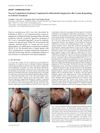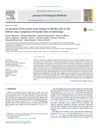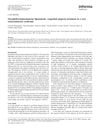
Search
for
Sort by
Research
960-990 / 1000+ results

research Cognitive and Mood Side Effects of Lower Urinary Tract Medication
Some medications for bladder problems can cause memory issues or mood changes, and doctors should monitor these side effects.

research Finasteride Delays the Onset of Maternal Behavior in Primigravid Rats
Finasteride slows down motherly behavior in first-time pregnant rats.
research Relating Neurosteroid Modulation of Inhibitory Neurotransmission to Behavior
Neurosteroids can influence behavior by modulating brain inhibition, with potential for treating psychiatric disorders.

research Neonatal Finasteride Administration Alters Hippocampal α4 and δ GABAAR Subunits Expression and Behavioral Responses to Progesterone in Adult Rats

research Cutaneous Reactions to Targeted Therapies in Children with CNS Tumors: A Cross-Sectional Study
Most children with CNS tumors on targeted therapy had skin reactions, which were generally treatable without stopping the therapy.

research Intermittent and Persistent Type 2 Lupus: Patient Perspectives on Two Distinct Patterns of Type 2 SLE Symptoms
SLE patients experience two patterns of non-inflammatory symptoms: intermittent and persistent.

research Naevus Comedonicus Syndrome Complicated by Hidradenitis Suppurativa-like Lesions Responding to Acitretin Treatment
Acitretin significantly reduced inflammatory attacks in a woman with Naevus Comedonicus Syndrome but caused side effects.

research Non-Hemorrhage-Related Adverse Effects of Rivaroxaban
Rivaroxaban can cause liver injury, allergic reactions, blood vessel inflammation, and hair loss, but these side effects are rare.

research The Symptom Experiences of Puerto Rican Children Undergoing Cancer Treatments and Alleviation Practices as Reported by Their Mothers
Puerto Rican children with cancer often experience symptoms like irritability, nausea, and hair loss, and need better education and continuous symptom management.

research Nocebo Effect in Dermatology
Negative expectations can cause adverse effects in dermatology treatments, like with finasteride for baldness, and careful communication can help reduce these nocebo responses.

research Dihydrotestosterone Induces Proliferation, Migration, and Invasion of Human Glioblastoma Cell Lines
Dihydrotestosterone increases growth and spread of human brain cancer cells, and blocking its formation might help treat this cancer.

research Localization of the Rabies Virus Antigen in Merkel Cells in the Follicle-Sinus Complexes of Muzzle Skins of Rabid Dogs
Rabies virus was found in specific skin cells of rabid dogs' muzzles, suggesting these cells could help diagnose rabies.

research Bipolar Disorders and Valproate: Pharmacokinetics, Pharmacodynamics, Therapeutic Effects, and Indications of Valproate: Review of Articles
Valproate is a mood stabilizer for bipolar disorder but has side effects and risks, especially during pregnancy.

research Anti-Nociceptive and Anti-Inflammatory Properties of 5alpha-Reductase Inhibitor Finasteride in Experimental Animals
Finasteride helps reduce pain and inflammation in animals.

research Bisphenol-A Antagonizes the Rapidly Modulating Effect of Dihydrotestosterone on Spinogenesis and Long-Term Potentiation of Hippocampal Neurons
Bisphenol-A (BPA) increases connections between brain cells and boosts their activity, but it blocks the effects of a male hormone on brain cell plasticity.

research Safety Considerations and Monitoring in Patients Treated with Systemic Medications for Acne
Some acne medications have side effects; doctors should educate patients and may not need to do frequent lab tests for all.

research Systemic Effects of Leucaena Leucocephala Ingestion on Ringtailed Lemurs (Lemur Catta) at Berenty Reserve, Madagascar
Ingesting Leucaena leucocephala caused hair loss and increased infant mortality in ringtailed lemurs.

research Caffeine Content in Newborn Hair Correlates with Maternal Dietary Intake
Newborns' hair shows how much caffeine their mothers drank during pregnancy.

research Caffeine and Its Pharmacological Benefits in the Management of Androgenetic Alopecia: A Review
Caffeine improves hair growth, thickness, and reduces shedding.

research CD99 Is Strongly Expressed in Basal Cells of the Normal Adult Epidermis and Some Subpopulations of Appendages: Comparison with Developing Fetal Skin
CD99 is highly present in certain skin cells and could help treat skin conditions.

research Skin Features in Myotonic Dystrophy Type 1: An Observational Study
People with Myotonic Dystrophy type 1 are more likely to have certain skin conditions, but not more likely to get skin cancer.

research Effect of Ethanol Adiantum Capillus-Veneris Extract in Experimental Models of Anxiety and Depression
Maidenhair fern extract reduced anxiety and depression in rats and may work due to its antioxidant and anti-inflammatory properties.

research Recent Developments in Alopecias
Recent hair loss research shows some progress, especially in understanding male pattern baldness, but effective treatments for many types of hair loss are still lacking.

research Nail Loss After Teriflunomide Treatment: A New Potential Adverse Event
Nail loss may be a side effect of the MS drug teriflunomide.

research Scaled Quantum Chemical Studies of the Molecular Structure and Vibrational Spectra of Minoxidil
The analysis shows where minoxidil's atoms are likely to react and describes its electronic transitions and behavior with temperature changes.

research A Thallium-Based Screening Procedure to Identify Molecules That Modulate the Activity of Ca2+-Activated Monovalent Cation-Selective Channels
The conclusion is that a new test was created to find substances that affect specific ion channels, and it works well for drug discovery.

research Somatization in Dermatology Patients: Sociocultural Perspectives
Skin symptoms without a medical cause often reflect psychological stress and are influenced by culture, requiring a team approach for treatment.

research Effect of Allopregnanolone and Allotetrahydrodeoxycorticosterone on Spike-Wave Discharges in the EEG of Absence Epilepsy Rat Models
The steroids allopregnanolone and allotetrahydrodeoxycorticosteron worsened absence seizures in rats.

research Encephalocraniocutaneous Lipomatosis: Congenital Alopecia Treatment in a Rare Neurocutaneous Syndrome
A girl with a rare syndrome had successful hair loss treatment with no relapse after 4 years.